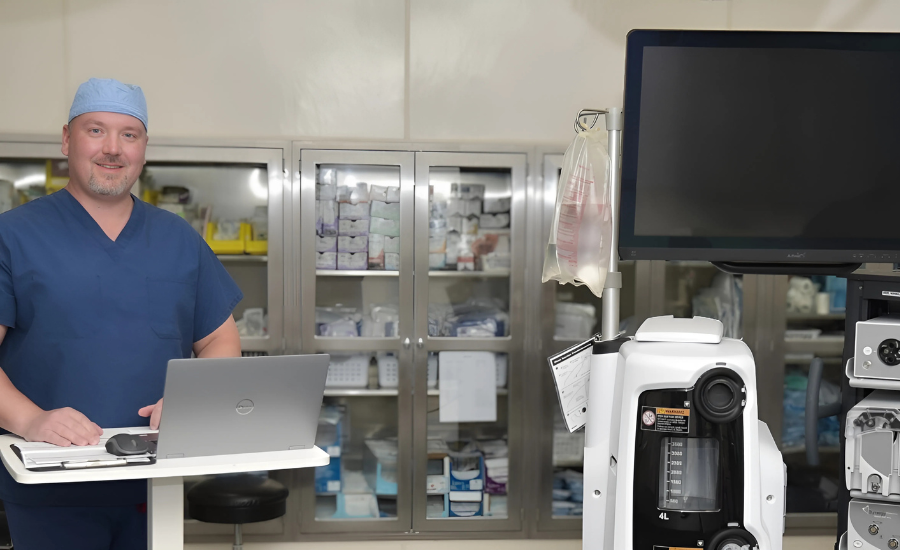
What Is Hip Replacement?

Meet Our Hip Replacement Specialists
Doctors Near You
Get the care you deserve close to home at one of our New Jersey Locations.
About Hip Replacement Surgery

When Do You Need Hip Replacement Surgery?
If you’re experiencing severe hip pain or stiffness that limits your daily activities, you may need hip replacement surgery — especially if pain management is not possible through non-surgical treatments such as medication or physical therapy.
At Academy Orthopedics, we understand that the thought of surgery can be scary. That’s why our board-certified physicians and experienced team are dedicated to providing personalized care — from your first consultation to your pre-op, surgery and recovery.
Each of our physicians has a longstanding history of delivering phenomenal outcomes for hip replacement patients who are seeking pain relief and an improved quality of life.
At Academy Orthopedics hip replacements are performed by board-certified physician Dr. Craig Wright and Dr. Max Willinger.
If you’re not sure whether a hip replacement is right for you, schedule a consultation with our team. Along with total and partial hip replacement, we offer multiple solutions for pain relief and joint care, including hip repair surgery & preservation for patients with hip dysplasia, arthritis and similar conditions.
We’ll work with you to find the best solution and deliver the best care possible, to get you back to the activities you love.
Conditions That May Require Hip Replacement Surgery
There are many different conditions that can damage the hip joint and require surgery to relieve pain and improve mobility. These conditions include:
Osteoarthritis is one of the most common forms of arthritis and also one of the most common reasons for hip replacement surgery. It causes the cartilage in the hip joint to wear down over time, which can lead to pain, reduced movement and joint damage.
As opposed to osteoarthritis, which is mainly caused by mechanical wear and tear on joints, rheumatoid arthritis is an autoimmune disease that can affect the hip joint, beginning with the lining of the joints.
Typically occurring between age 30 to 50, the condition affects women more than men, and causes symptoms that include inflammation, pain and joint damage.
When bones do not receive enough blood, they can deteriorate more quickly than the body can replenish them. As a result, the bone tissue can weaken, eventually leading to collapse. Also called osteonecrosis, avascular necrosis is a disease that occurs when blood supply to the bones is disrupted or lost.
Hip fractures are most common in older adults, mainly because bones become weaker and thinner with age. In some situations, a broken hip might be treated with surgery that stabilizes the joint. But if the hip fracture is severe, it may require a total hip replacement surgery — especially if the blood supply to the ball part of the hip was damaged.
This condition occurs when the hip joint doesn’t develop properly, which can lead to arthritis, pain and instability.
Hip dysplasia also increases the risk of developing osteoarthritis at an earlier age. In some cases, it can be treated with physical therapy, but in severe cases it may require total hip replacement surgery.
Although bone tumors are rare, they may develop in the hip joint and require surgery to remove the affected tissue and replace the joint.
In most cases these tumors are benign, but they can develop into a serious medical issue if they weaken the bones.
Types of Hip Replacement Surgery
While there are several different types of hip replacement surgery, the two most common procedures we perform are total hip replacement and partial hip replacement.
Our team will determine the best solution for you, based on the extent of joint damage, your age, activity level and medical conditions.
Total Hip Replacement
Also known as total hip arthroplasty, both the ball and socket of the hip joint are replaced with artificial components in a total hip replacement.
The damaged bone and cartilage are removed and replaced with metal, plastic, or ceramic components that mimic the natural structure and function of the hip joint.
Total hip replacement surgery is often recommended for older patients or those with limited activity levels.
Partial Hip Replacement
Also known as hip hemiarthroplasty, only the ball of the hip joint is replaced with an artificial component, in a partial hip replacement.
In this procedure, the socket of the hip joint is left intact. A partial hip replacement is usually performed to treat a fractured hip or a degenerative condition that affects only the ball of the hip joint.
Partial hip replacement surgery may be more appropriate for younger, more active patients.
How Is Hip Replacement Surgery Performed?
The two most common approaches to hip replacement are anterior and posterior incisions.
The approach we use is determined by various factors, including the patient’s anatomy and medical history, surgeon preference and expected recovery time.
Anterior Hip Replacement
In an anterior hip replacement, we make a small incision on the front of the hip joint and use a special surgical table to access the joint from the front.
This approach allows us to avoid major muscles, providing you with a faster recovery and less pain after the surgery.
Posterior Hip Replacement
In a posterior hip replacement, we make an incision on the back of the hip joint and access the joint through the muscles at the back of the hip.
The main advantage of posterior hip replacement is that it allows us to access the hip joint easily and provides good visibility of the joint during the surgery.
How Long Does Hip Replacement Surgery Take?
Hip replacement surgery typically takes about one to two hours to complete.
The exact amount of time depends on several factors, including the complexity of the procedure and the approach we take.
Our team at Academy Orthopedics will walk you through exactly what you can expect in terms of pre-op, surgery and post-op recovery.
How To Prepare for Hip Replacement Surgery
From medication or diet restrictions before surgery to transportation and at-home set up afterwards, we’ll help make sure you are fully prepared for your procedure.
Well before your surgery, we’ll assess your medications and supplements, conduct blood work and explain what to do beforehand to prepare your body for surgery.
This might include avoiding food and water for 12 hours pre-surgery or transitioning to a first-floor bedroom for optimal comfort after your operation.
Your Academy Orthopedics physician and care team will walk you through everything you need to know to help put your mind at ease.
How Long Does It Take To Recover From Hip Replacement Surgery?
It can take several weeks to several months to fully recover from hip replacement surgery.
It’s important to keep in mind that everyone’s journey to recovery is different. The length of your recovery will depend on several factors, such as your age, overall health, fitness level, and the surgical approach we take to ensure the best outcome.
How To Recover From Hip Replacement Surgery
Life post-surgery may look different, depending on your age and overall health. While some patients remain in the hospital for several days, others are able to return to the comfort of their home, just hours after a smooth and successful operation.
After being discharged from the hospital, you will proceed with physical therapy and a personalized rehabilitation program. This might involve exercises, stretches, and other therapies designed to help you regain full use of your hip joint over time.
To make your recovery as pain-free and smooth as possible, here’s an overview of the aspects that are typically included:
Physical therapy is an important part of the recovery process after hip replacement surgery.
We will create a personalized exercise program to help you regain strength, flexibility, and mobility in your hip joint. The exercises may include gentle movements, stretches, and strength training exercises.
After hip replacement surgery, it’s important to stay active to maintain the health and strength of your hip joint. We typically recommend low-impact exercises, such as walking, swimming, or cycling, to help you stay active without putting too much strain on your hip.
For the first couple of weeks or even the first month post-surgery, you may not be able to swim or cycle. But progressively as you’re feeling better, you will be able to adjust and add new exercises to your routine. It’s important to keep those muscles active!
In general, you’ll want to avoid activities where you put a lot of pressure on your hip, such as running or jumping, as they can cause damage to your new joint.
Eating a balanced diet can help your body heal and recover. Vegetables, fruits and plenty of protein will support your recovery and your general health.
Our team at Academy Orthopedics will work with you to develop a healthy plan that supports your active recovery.
You may be prescribed medications such as painkillers or medication for preventing blood clots. It’s important to take these medications as instructed and to report any side effects or concerns you may have. If you’re thinking about using some new medications or supplements, please consult with our team first.
Proper incision care is important to prevent infection and promote healing after hip replacement surgery.
We’ll provide you with detailed instructions on how to take care of your incision wound. We’ll walk you through each step, including how to keep the incision clean and dry, and when to change your bandages to avoid infections.
Alternatives to Hip Replacement Surgery
If you’re experiencing hip pain but are hesitant to undergo surgery, non-surgical alternatives may be able to help you manage your symptoms.
Some of these options include physical therapy, anti-inflammatory medications, corticosteroid injections and joint supplements.
These treatments can be effective for some patients — especially those with mild to moderate hip pain. But if your hip pain is impacting your daily movement and quality of life, it might be time to consider hip replacement surgery.
Make an appointment with a board-certified physician at an Academy Orthopedics location near you to discuss your options for pain management. Whether the recommended course of treatment is a non-surgical option or a hip replacement, our team will be by your side every step of the way.













